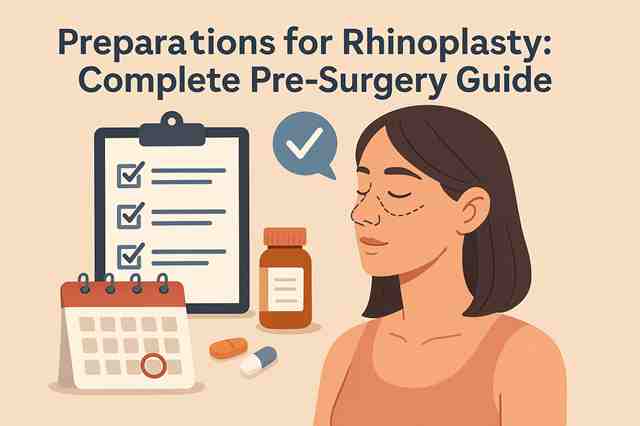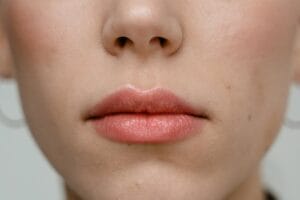Preparations for Rhinoplasty: Complete Pre-Surgery Guide
You’ve made the decision to move forward with rhinoplasty, and now the crucial phase of preparations for rhinoplasty begins. Maybe you’ve been thinking about it for months, or perhaps years. That consultation where your surgeon walked you through the possibilities—the improved breathing, the refined profile, the confidence boost—is behind you. Now comes the part that many people find overwhelming: getting ready for the actual procedure.
What should you do to prepare for rhinoplasty?
Preparing for rhinoplasty involves several key steps: stop blood-thinning medications and supplements about two weeks before surgery, quit smoking for at least 4-6 weeks, arrange transportation and support for recovery, set up a comfortable elevated recovery space at home, follow fasting instructions before surgery, and attend all preoperative appointments. Consult your surgeon for specific guidelines tailored to your medical history.
Here’s the thing about preparations for rhinoplasty: it’s not just about showing up on surgery day. What you do in the weeks leading up to your procedure can significantly impact both your surgical outcome and your recovery experience. In my practice, I’ve observed that patients who invest time in proper preparation tend to have smoother recoveries and express higher satisfaction with their results.
The catch? There’s a lot of information out there, and not all of it’s accurate. Some advice you’ll find is overly cautious, while other suggestions might downplay important considerations. That’s where this guide comes in—we’re going to walk through everything you need to know about preparing for rhinoplasty, from medications and lifestyle changes to the practical realities of recovery.
What Does Preparing for Rhinoplasty Actually Involve?
Most people think of rhinoplasty preparation as a simple checklist: stop taking aspirin, arrange transportation, done. But effective preparation is more nuanced than that. It’s about creating conditions in your body that favor healing, setting up your environment for comfort and safety, and managing expectations realistically.
Clinicians report that patients who follow preoperative guidelines carefully experience fewer complications and often see their swelling resolve more quickly. This isn’t coincidental. When your body isn’t fighting against blood-thinning medications or dealing with inflammation from smoking, it can focus its resources on the intricate work of healing.
Effective preparations for rhinoplasty typically fall into several categories: medical and medication management, lifestyle adjustments, practical arrangements, and psychological readiness. Each area matters, though some will be more critical than others depending on your specific situation.
Let me explain what you’ll encounter in each area, and why these preparations aren’t just formalities—they’re genuinely protective.
Medical Preparations for Rhinoplasty: Medications, Supplements, and Health Optimization
This is where most surgeons spend significant time during preoperative consultations, and for good reason. Medications and supplements can affect bleeding, healing, and anesthesia safety in ways that might surprise you.
Medications to Stop During Preparations for Rhinoplasty
Here’s what you need to know about medications as part of your preparations for rhinoplasty: many over-the-counter pain relievers thin your blood, which increases bleeding risk during surgery. This matters more than you might think. During rhinoplasty, your surgeon works in a delicate area with precise control. Excessive bleeding can obscure the surgical field, potentially affecting precision and outcome.
Your surgeon will give you a specific timeline, but generally, as part of your preparations for rhinoplasty, you’ll need to stop certain medications about two weeks before your procedure. This typically includes:
- Aspirin and aspirin-containing products
- Nonsteroidal anti-inflammatory drugs (NSAIDs) like ibuprofen, naproxen, and similar medications
- Certain herbal supplements that affect bleeding, such as ginkgo biloba, garlic supplements, and fish oil
- Vitamin E supplements in high doses
But what if you take these medications for chronic conditions? That’s where clear communication with both your surgeon and your primary care physician becomes crucial. Don’t just stop taking prescribed medications without medical guidance—your surgeon needs to know about every medication you’re taking so they can help you navigate safe alternatives.
I should mention acetaminophen (Tylenol), which is generally safe to continue taking as directed since it doesn’t affect blood clotting. Still, confirm this with your surgical team, as individual circumstances vary.
Pre-Surgery Health Optimization
Your body’s ability to heal after rhinoplasty depends partly on your baseline health. This doesn’t mean you need to be an athlete or have perfect health—but certain conditions can impact recovery.
If you have conditions like diabetes or high blood pressure, they should be well-controlled before surgery. Uncontrolled diabetes, for instance, can significantly impair wound healing and increase infection risk. Your surgeon will likely check your blood sugar levels and may request clearance from your primary care doctor if your numbers aren’t in a good range.
Infections are another consideration. Active infections—even something as minor as a cold or sinus infection—can delay surgery. Your surgeon will likely ask about recent illnesses during your preoperative visit, and honestly, it’s worth being upfront if you’re feeling under the weather. Rescheduling a few weeks out is better than proceeding when your body needs to fight off an infection instead of focusing on healing.
Some patients wonder about weight and overall fitness. While extreme obesity can increase surgical risks in general, for rhinoplasty specifically, the connection is less direct. That said, being in reasonable physical shape can support recovery. You don’t need to start training for a marathon, but staying active (within any physical limitations you might have) helps maintain good circulation and overall health.
Lifestyle Adjustments for Rhinoplasty Preparation: Smoking
Let’s talk about smoking—this is non-negotiable in your preparations for rhinoplasty. If you smoke, you’ll need to stop before rhinoplasty, and your surgeon will be very clear about this requirement.
Here’s why: smoking constricts blood vessels, reducing blood flow to surgical sites. In rhinoplasty, where precise healing of delicate nasal tissues is critical, compromised blood flow can lead to delayed healing, increased scarring, and in severe cases, tissue loss. Some surgeons won’t perform rhinoplasty on active smokers because the risks are too significant.
The timeline varies by surgeon, but most will want you to stop smoking at least four to six weeks before surgery as part of your preparations for rhinoplasty, and continue abstaining through recovery. Nicotine is the main culprit, so this includes vaping and nicotine patches or gum. The goal is complete elimination of nicotine from your system.
Preparations for Rhinoplasty: Alcohol and Daily Habits
Alcohol consumption is another area to address. While moderate drinking might not be completely prohibited until right before surgery, heavy drinking can affect your liver function and how your body processes anesthesia medications. Most surgeons recommend avoiding alcohol for at least a week before surgery, and some prefer two weeks. Again, follow your specific surgeon’s guidelines—they know your medical history and planned procedure details.
Diet and hydration matter more than people realize. Leading up to surgery, focus on a balanced diet rich in nutrients that support healing: protein, vitamin C, zinc, and adequate hydration. You don’t need special supplements (and remember, check with your surgeon before adding any), but eating well gives your body the building blocks it needs for recovery.
Some patients find it helpful to meal prep before surgery, since you won’t feel like cooking in the first few days afterward. Soft foods that don’t require much chewing can be especially helpful in the immediate post-surgery period when your face might be swollen or tender.
Practical Preparations for Rhinoplasty: Transportation, Support, and Home Setup
Rhinoplasty is typically performed under general anesthesia or deep sedation, which means you cannot drive yourself home afterward. This isn’t negotiable—it’s a safety requirement. As part of your preparations for rhinoplasty, arrange for someone to pick you up and stay with you for at least the first 24 hours.
That support person has an important role: they’ll help monitor you initially, assist with medications, and handle tasks you shouldn’t be doing while recovering. Choose someone reliable who understands the importance of their role.
Setting up your recovery space before surgery makes a huge difference. Create a comfortable area where you can rest with your head elevated—this reduces swelling. Prop pillows strategically, gather entertainment options within easy reach, and make sure you have essentials nearby: water, medications, lip balm (breathing through your mouth initially can dry your lips), and easy-to-eat snacks.
Most surgeons recommend keeping your head elevated at a 30-45 degree angle for at least the first week, even while sleeping. This might take some creative pillow arranging, but it’s worth the effort. Elevated positioning helps minimize swelling by promoting fluid drainage.
Stock up on supplies before surgery day. You’ll want soft foods, plenty of liquids, gauze if your surgeon provides specific instructions about nasal dressings, and any medications prescribed ahead of time. Having everything ready means less stress during recovery.
The Day Before Surgery: Final Preparations for Rhinoplasty
The 24 hours before your rhinoplasty procedure involve specific steps that maximize safety and minimize complications. These final preparations for rhinoplasty are critical.
Your surgeon will provide clear instructions about when to stop eating and drinking before surgery—this is critical for anesthesia safety. Typically, as part of your final preparations for rhinoplasty, you’ll need to fast (no food or liquids) starting the night before, usually around midnight if your surgery is in the morning. Follow these instructions exactly—eating or drinking too close to surgery can lead to serious complications during anesthesia.
Some surgeons have specific bathing instructions the night before or morning of surgery. They might ask you to use an antibacterial soap or avoid certain products. This helps reduce skin bacteria that could potentially cause infections.
Wear comfortable, loose-fitting clothing that buttons or zips in the front—avoid anything that needs to be pulled over your head, since you’ll want to avoid touching your face and nose area post-surgery.
Remove all jewelry, nail polish, and contact lenses before arriving at the surgical facility. These might seem like minor details, but they’re important for safety and monitoring during the procedure.
Prepare a list of questions or concerns to discuss during your final pre-surgery check-in. Even if you think you’ve covered everything, having notes ensures you don’t forget anything important in the moment.
Managing Expectations and Mental Preparation
Here’s what many patients find surprising: the mental and emotional preparation for rhinoplasty is just as important as the physical preparation.
First, understand that rhinoplasty results don’t appear immediately. You’ll have swelling and possibly bruising initially. Your nose might look different than expected in the first weeks—this is normal. The final shape becomes apparent gradually over several months, with subtle changes continuing for up to a year or more in some cases.
Set realistic expectations by reviewing before-and-after photos with your surgeon that reflect results similar to what you’re hoping to achieve. Be honest about your goals, and make sure you and your surgeon are aligned. If you’re seeking perfection or trying to replicate someone else’s nose exactly, you might need to adjust those expectations.
The recovery period requires patience. You’ll have activity restrictions, dietary considerations, and the need to protect your nose from impact. This can be frustrating, especially for active individuals. Plan for this mentally—know that it’s temporary and necessary for optimal healing.
Some patients experience emotional ups and downs during recovery, particularly when swelling makes results look less than ideal initially. This is common and usually temporary. Having support people who understand this can help tremendously.
Understanding Your Preoperative Appointment for Rhinoplasty
Your final preoperative appointment, usually scheduled a week or two before surgery, is where everything comes together in your preparations for rhinoplasty. Your surgeon will review your medical history again, do a final physical examination, take photographs for surgical planning and documentation, and address any last-minute questions.
This appointment might include blood work or other tests to ensure you’re cleared for surgery. Your anesthesia provider might also evaluate you at this time, particularly if you have complex medical conditions.
Use this appointment wisely. Bring questions written down, discuss any concerns, and make sure you understand your surgeon’s specific instructions for your case. Every rhinoplasty is customized, so your preparations for rhinoplasty might differ slightly from general guidelines.
Final Checklist: Week-of Surgery Preparation
As your surgery date approaches, use this checklist to ensure you’re fully prepared:
- All medications and supplements reviewed with surgeon; inappropriate ones stopped
- Smoking and nicotine products eliminated for required timeframe
- Alcohol consumption stopped per surgeon’s guidelines
- Transportation and support person arranged for surgery day and initial recovery
- Recovery space set up at home with proper elevation and supplies
- Soft foods and easy meals prepared or purchased
- Prescribed medications filled and ready
- Final questions written down for preoperative appointment
- Work and responsibilities arranged for recovery time off
- Clothing and personal items prepared for surgery day (front-opening, comfortable)
Most importantly, follow your surgeon’s specific instructions. They know your medical history, your planned procedure, and what will optimize your particular outcome. If something seems unclear or conflicts with other advice you’ve received, ask for clarification rather than guessing.
What Makes Preparation Successful?
Successful rhinoplasty preparation isn’t about perfection—it’s about thoughtful attention to the factors you can control. You can’t eliminate all risks, but you can stack the odds in favor of smooth healing by following medical guidance, making practical arrangements, and setting realistic expectations.
The patients I’ve seen who approach preparation methodically—who ask questions, follow guidelines, and prepare their environment—consistently report better recovery experiences. They feel more in control, experience less anxiety, and often see their results emerge more smoothly.
Your surgeon has seen hundreds or thousands of rhinoplasty procedures. Their preparation guidelines come from experience with what works and what causes problems. Trust that expertise, but also advocate for yourself by communicating openly about your circumstances and concerns.
The Bottom Line
Preparing for rhinoplasty involves multiple interconnected elements: medical optimization, lifestyle adjustments, practical arrangements, and mental readiness. Each area matters, and skipping steps can impact your experience and results.
The good news? Most of this is straightforward once you understand why each element matters. Your surgical team will guide you through specific requirements, but understanding the bigger picture—why these preparations exist and how they support your healing—helps you commit to them fully.
If you’re feeling overwhelmed by the preparation process, remember that you’re not doing this alone. Your surgeon and their team are there to support you through every step. Don’t hesitate to reach out with questions as your surgery date approaches.
Proper preparations for rhinoplasty set the foundation for everything that follows. Invest the time and attention now, and you’ll give yourself the best possible start on your rhinoplasty journey.













